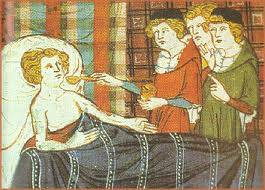Flu has been around forever, it is known that a major epidemic of something similar to influenza followed Charlemagne and his army across Europe in the middle of the ninth century. Medical experts suggest it arrived in Italy and spread northwards, and this is well documented. Repeated influenza pandemics broke out in this pattern between the sixteenth and eighteenth centuries.
This virus has been described as a
"cough that spreads like the plague"
Modern historians believe that a sickness that was present at the Siege of Troy was Influenza.
It had been described in the Iliad that a nine day epidemic had its beginnings in the Trojan War, its symptoms first affecting horses and dogs.
However in a paper "Animal Influenza in the Ancient Literature" it states that
"domestic animals associated with possible human influenza outbreaks in the ancient literature are ultimately inconclusive."
Flu was not a major worry in the fourteenth century but was the bane of the lives of those in the fifteenth century and inflicted terrible losses within the life time of our grandparents too.
This little nursery rhyme was sung on England's school playgrounds throughout the country.
I had a little bird
Its name was Enza
I opened the window
and in-flu-enza
The nursery rhyme was referring to the influenza virus that was spreading across the country at a great rate. As the Great War was ending, a threat was emerging that was even more lethal than the fighting that had brutally cut down so many young men. The pandemic of 1918-19 claimed the lives of between twenty and forty million people around the world, at least three times the number killed in war. More died in a single year than died in the four years of the Black Death from 1347 to 1351. At the height of the pandemic, in the Yorkshire city of Sheffield, over 3000 people were dying a week. Not only were hospitals unable to cope, but with a shortage of both labour and coffins, mortuaries and undertakers were overwhelmed.
Of the virus Charles Cheighton in his book, The History of Epidemics in Britain states that
"Influenza appears to correspond with something broadly the same in human life at all times and to have lasted unchanged through so many mutation from medieval to modern it is unique in history."
A resilient little blighter isn't it?
Its a good job that I am a cheerful soul, even if I do say so myself, or I might be panicking!
However, apart from a miserable few days the only trouble it caused in our house was that the dog went un-walked, no housework, no cakes baked and no time-travelling in the medieval world was done.
But as you can see from this new blog I am on the mend.
Atchoo !!!!!


 RSS Feed
RSS Feed
